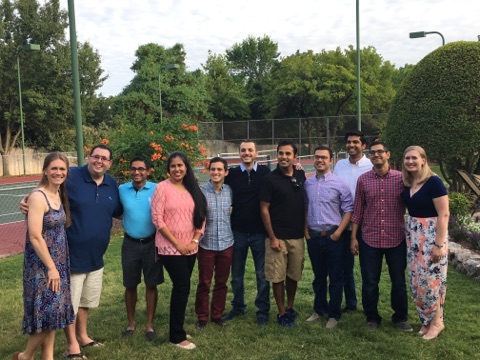 The University of Oklahoma Health Sciences Center, Gastroenterology Fellowship Program will be participating in the GI Match administered by the National Resident Matching Program (NRMP) for ACGME fellowship positions.
The University of Oklahoma Health Sciences Center, Gastroenterology Fellowship Program will be participating in the GI Match administered by the National Resident Matching Program (NRMP) for ACGME fellowship positions.
The program accepts applications through the Electronic Residency Application System (ERAS). The ERAS website: http://www.aamc.org/eras.
No information will be accepted by the applicant EXCEPT what is provided in ERAS. Email communications, submission of applications or a curriculum vitae, and other materials will not be accepted.
We ask that all applicants please read the Joint Society Memorandum and the Match Resolution regarding Gastroenterology fellowship applicants, which we as a program are committed to adhering to.
For the application to be complete, the following list of items will be needed on the ERAS application in addition to the common application form. All applicants will have to meet the University of Oklahoma Health Sciences Center Graduate Medical Education eligibility requirements.
- Personal Statement
- CV
- Medical School Transcript
- Three Letters of Recommendation, one of which must be from the Internal Medicine Residency Program Director or current Program Director
- USMLE Scores (Steps 1, 2 and 3)
- Complex Scores (DO)
Important Dates:
- Internal Medicine Subspecialty-Gastroenterology Fellowship, ERAS Application Process opens in July.
- We will review all applications received between July 15 through August 15, 2021.
- Candidates will be notified of an invitation to interview by September, 2021.
- We will be hosting two virtual interview sessions, between the end of September and the end of October.
- Registration for NRMP Match List opens in August.
- NRMP Rank Order List closes in November.
- NRMP Match Day in December.
- Fellows begin the first day of their training on July 1, 2022.
Questions/comments should be addressed to: Autumn-crawford@ouhsc.edu.
Board Eligibility Requirements:
At the time of application for certification in a sub-specialty, physicians must have been previously certified in Internal Medicine by the ABIM. To become certified in a sub-specialty, a physician must satisfactorily complete the requisite graduate medical education fellowship training, demonstrate clinical competence, and procedural skills.
Fellowship must be accredited by the Accreditation Council for Graduate Medical Education (ACGME), the Royal College of Physicians and Surgeons of Canada, or the Collège des médecins du Québec. No credit will be granted toward certification in a sub-specialty for training completed outside of an accredited U.S. or Canadian program. Fellowship training taken before completing the requirements for the MD or DO degree, training as a chief medical resident, practice experience and attendance at postgraduate courses may not be credited toward the training requirements for sub-specialty certification.
To be admitted to an examination, candidates must have completed the required training in the sub-specialty, including vacation time, by October 31 of the year of examination.
Training and Procedural Requirements:
Candidates for certification in the sub-specialties must meet ABIM's requirements for duration of training as well as minimum duration of full-time clinical training. Time spent in continuity outpatient clinics, during non-clinical training, is in addition to the requirement for full-time clinical training. Educational rotations completed during training may not be double-counted to satisfy both internal medicine and sub-specialty training requirements.
The total months of training required including specific clinical months are outlined in the table below.
|
MINIMUM MONTHS OF TRAINING/CLINICAL MONTHS REQUIRED
|
|
SUBSPECIALTY
|
TOTAL MONTHS OF TRAINING
|
CLINICAL MONTHS
|
|
Gastroenterology
|
36
|
18
|
Clinical Competence Requirements
ABIM requires documentation that candidates for certification in the sub-specialties are competent in: (1) patient care and procedural skills (which includes medical interviewing and physical examination skills); (2) medical knowledge; (3) practice-based learning and improvement; (4) interpersonal and communication skills; (5) professionalism; and (6) systems-based practice. The trainee must receive a rating of satisfactory for upper and lower endoscopy skills as entered in the ABIM Fastrack by the training program. Through its tracking process, FasTrack®, ABIM requires verification of sub-specialty fellows' clinical competence from the sub-specialty training program director.
Life in Oklahoma City
 The University of Oklahoma Health Sciences Center campus is one of only a few comprehensive health centers in the nation with seven health professions colleges – Allied Health, Dentistry, Medicine, Nursing, Pharmacy, Public Health and Graduate Studies – right in the heart of Oklahoma City. The Oklahoma City metro area has great educational opportunities, professional sports, a strong economy, a commitment to the arts, and one of the lowest costs of living in the United States. Read more about life in Oklahoma City.
The University of Oklahoma Health Sciences Center campus is one of only a few comprehensive health centers in the nation with seven health professions colleges – Allied Health, Dentistry, Medicine, Nursing, Pharmacy, Public Health and Graduate Studies – right in the heart of Oklahoma City. The Oklahoma City metro area has great educational opportunities, professional sports, a strong economy, a commitment to the arts, and one of the lowest costs of living in the United States. Read more about life in Oklahoma City.